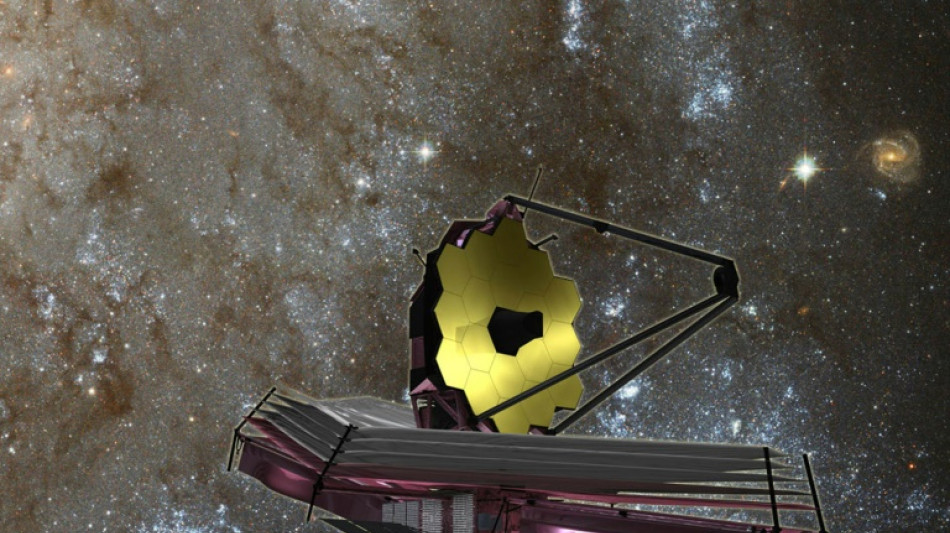
-
 Stocks diverge as rate hopes rise, AI fears ease
Stocks diverge as rate hopes rise, AI fears ease
-
Man City players face Christmas weigh-in as Guardiola issues 'fatty' warning

-
 German Christmas markets hit by flood of fake news
German Christmas markets hit by flood of fake news
-
Liverpool fear Isak has broken leg: reports

-
 West Indies captain says he 'let the team down' in New Zealand Tests
West Indies captain says he 'let the team down' in New Zealand Tests
-
Thailand says Cambodia agrees to border talks after ASEAN meet

-
 Alleged Bondi shooters conducted 'tactical' training in countryside, Australian police say
Alleged Bondi shooters conducted 'tactical' training in countryside, Australian police say
-
Swiss court to hear landmark climate case against cement giant

-
 Knicks' Brunson scores 47, Bulls edge Hawks epic
Knicks' Brunson scores 47, Bulls edge Hawks epic
-
Global nuclear arms control under pressure in 2026

-
 Asian markets rally with Wall St as rate hopes rise, AI fears ease
Asian markets rally with Wall St as rate hopes rise, AI fears ease
-
Jailed Malaysian ex-PM Najib loses bid for house arrest

-
 Banned film exposes Hong Kong's censorship trend, director says
Banned film exposes Hong Kong's censorship trend, director says
-
Duffy, Patel force West Indies collapse as NZ close in on Test series win

-
 Australian state pushes tough gun laws, 'terror symbols' ban after shooting
Australian state pushes tough gun laws, 'terror symbols' ban after shooting
-
A night out on the town during Nigeria's 'Detty December'

-
 US in 'pursuit' of third oil tanker in Caribbean: official
US in 'pursuit' of third oil tanker in Caribbean: official
-
CO2 soon to be buried under North Sea oil platform

-
 Steelers edge Lions as Bears, 49ers reach playoffs
Steelers edge Lions as Bears, 49ers reach playoffs
-
India's Bollywood counts costs as star fees squeeze profits

-
 McCullum admits errors in Ashes preparations as England look to salvage pride
McCullum admits errors in Ashes preparations as England look to salvage pride
-
Pets, pedis and peppermints: When the diva is a donkey

-
 'A den of bandits': Rwanda closes thousands of evangelical churches
'A den of bandits': Rwanda closes thousands of evangelical churches
-
Southeast Asia bloc meets to press Thailand, Cambodia on truce

-
 As US battles China on AI, some companies choose Chinese
As US battles China on AI, some companies choose Chinese
-
AI resurrections of dead celebrities amuse and rankle

-
 EON Resources Inc. Reports Management and Directors Buy an Additional 282,000 Shares of EON Class A Common Stock for a Total of 1,561,000 Shares Bought in 2025 and a Total Ownership of Over 5 million Shares
EON Resources Inc. Reports Management and Directors Buy an Additional 282,000 Shares of EON Class A Common Stock for a Total of 1,561,000 Shares Bought in 2025 and a Total Ownership of Over 5 million Shares
-
Heirs Energies Agrees $750m Afreximbank Financing to Drive Long-Term Growth

-
 Black Book Poll: "Governed AI" Emerges as the Deciding Factor in 2026 NHS Procurement
Black Book Poll: "Governed AI" Emerges as the Deciding Factor in 2026 NHS Procurement
-
Hemogenyx Pharmaceuticals PLC Announces Update on Admission of Shares

-
 Pantheon Resources PLC Announces Shareholder Letter and Corporate Update on Dubhe-1
Pantheon Resources PLC Announces Shareholder Letter and Corporate Update on Dubhe-1
-
Tocvan Begins Trenching Material for the Pilot Mine and Pushes Ahead With Infrastructure Development

-
 Steelers receiver Metcalf strikes Lions fan
Steelers receiver Metcalf strikes Lions fan
-
Morocco coach 'taking no risks' with Hakimi fitness

-
 Gang members given hundreds-years-long sentences in El Salvador
Gang members given hundreds-years-long sentences in El Salvador
-
Chargers, Bills edge closer to playoff berths

-
 Gang members given hundred-years-long sentences in El Salvador
Gang members given hundred-years-long sentences in El Salvador
-
Hosts Morocco off to winning start at Africa Cup of Nations

-
 No jacket required for Emery as Villa dream of title glory
No jacket required for Emery as Villa dream of title glory
-
Amorim fears United captain Fernandes will be out 'a while'

-
 Nigerian government frees 130 kidnapped Catholic schoolchildren
Nigerian government frees 130 kidnapped Catholic schoolchildren
-
Captain Kane helps undermanned Bayern go nine clear in Bundesliga

-
 Captain Kane helps undermanned Bayern go nine clear
Captain Kane helps undermanned Bayern go nine clear
-
Rogers stars as Villa beat Man Utd to boost title bid

-
 Barca strengthen Liga lead at Villarreal, Atletico go third
Barca strengthen Liga lead at Villarreal, Atletico go third
-
Third 'Avatar' film soars to top in N. American box office debut

-
 Third day of Ukraine settlement talks to begin in Miami
Third day of Ukraine settlement talks to begin in Miami
-
Barcelona's Raphinha, Yamal strike in Villarreal win

-
 Macron, on UAE visit, announces new French aircraft carrier
Macron, on UAE visit, announces new French aircraft carrier
-
Barca's Raphinha, Yamal strike in Villarreal win


Webb spots surprisingly massive galaxies in early universe
The James Webb Space Telescope has spotted six massive galaxies that emerged not long after the Big Bang, a study said Wednesday, surprising scientists by forming at a speed that contradicts our current understanding of the universe.
Since becoming operational last July, the Webb telescope has been peering farther than ever before into the universe's distant reaches -- which also means it is looking back in time.
For its latest discovery, the telescope spied galaxies from between 500 to 700 years million years after the Big Bang 13.8 billion years ago, meaning the universe was under five percent of its current age.
Webb's NIRCam instrument, which operates in the near infrared wavelength invisible to the naked eye, observed the six galaxies in a little-known region of the sky, according to a study published in the journal Nature.
Two of the galaxies had previously been spotted by the Hubble Space Telescope but were so faint in those images that they went unnoticed.
These six new "candidate galaxies", so-called because their discovery still needs to be confirmed by other measurements, contain many more stars than scientists expected.
One galaxy is even believed to have around 100 billion stars.
That would make it around the size of the Milky Way, which is "crazy," the study's first author Ivo Labbe told AFP.
- 'Off a cliff' -
It took our home galaxy the entire life of the universe for all its stars to assemble.
For this young galaxy to achieve the same growth in just 700 million years, it would have had to grow around 20 times faster than the Milky Way, said Labbe, a researcher at Australia's Swinburne University of Technology.
For there to be such massive galaxies so soon after the Big Bang goes against the current cosmological model which represents science's best understanding of how the universe works.
"According to theory, galaxies grow slowly from very small beginnings at early times," Labbe said, adding that such galaxies were expected to be between 10 to 100 times smaller.
But the size of these galaxies "really go off a cliff," he said.
What could be going on? One suspect is mysterious dark matter, which makes up a sizeable amount of the Universe.
While much about dark matter remains unknown, scientists believe it plays a key role in the formation of galaxies.
When dark matter "clumps" together into a halo, it attracts gas from the surrounding universe which in turn forms a galaxy and its stars, Labbe said.
But this process is supposed to take a long time, and "in the early universe, there's just not that many clumps of dark matter," he said.
- 'Model is cracking' -
The newly discovered galaxies could indicate that things sped up far faster in the early universe than previously thought, allowing stars to form "much more efficiently," said David Elbaz, an astrophysicist at the French Atomic Energy Commission not involved in the research.
This could be linked to recent signs that the universe itself is expanding faster than we once believed, he added.
This subject sparks fierce debate among cosmologists, making this latest discovery "all the more exciting, because it is one more indication that the model is cracking," Elbaz said.
Elbaz is one of many scientists working on the European Space Agency's Euclid space telescope, which is scheduled to launch in July to join Webb in space.
Euclid's mission is to uncover the secrets of dark matter and dark energy -- and it could also help solve this latest mystery, Elbaz said.
Labbe referred to the "black swan theory", under which just one unexpected event can overturn our previous understanding -- such as when Europeans saw the first black swans in Australia.
He called the galaxies "six black swans -- if even one of them turns out to be true, then it means we have to change our theories."
Y.Kobayashi--AMWN



